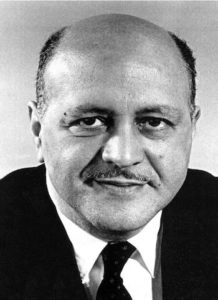
Robert Weaver
This date marks the birth of Robert Clifton Weaver in 1907. He was a Black economist, administrator, and the first Black to serve in the U.S. Cabinet.
Born in Washington, D.C., Weaver, the great-grandson of a slave, was educated at Dunbar H.S. and Harvard University. He held several positions in various agencies of the U.S. government for the next ten years, starting as the first Black adviser on racial problems in the Department of the Interior. After World War II, he served for a time in Chicago as executive director of the Mayor's Committee on Race Relations, taught briefly at several universities, and wrote: "Negro Labor: A National Problem" (1946) and "The Negro Ghetto" (1948).
From 1949 to 1955, he ran the John Hay Whitney Foundation fellowship program, after which he became rent commissioner in New York State and a member of the governor's cabinet. He was active in the American Civil Rights Movement and served for a year as national chairman of the NAACP. 1960, President John F. Kennedy appointed Weaver to head the federal Housing and Home Finance Agency. 1966, President Lyndon B. Johnson named him head of the new Department of Housing and Urban Development.
Weaver left the government in 1969 to become president of Bernard Baruch College of the City University of New York. From 1970 to 1978, I was a professor of urban affairs at Hunter College. His other publications include "The Urban Complex" and "Dilemmas of Urban America." After leaving his cabinet post, Weaver became president of Bernard M. Baruch College in 1969.
In 1970, he became a professor of Urban Affairs at Hunter College in New York. He retired from that post in 1978. Robert C. Weaver died on July 17, 1997, at 89. In 2000, the HUD headquarters building he had dedicated in 1968 was renamed the Robert C. Weaver Federal Building in his honor.
The African American Atlas
Black History & Culture an Illustrated Reference
by Molefi K. Asanta and Mark T. Mattson
Macmillan USA, Simon & Schuster, New York
ISBN 0-02-864984-2